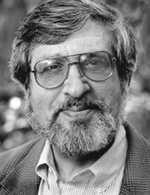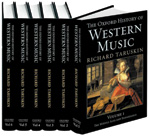|
|
 |
 |
 |
 |
|
BOOKSHELF After 13 Years, It’s a History
|
|||||||||||||||||||||||||||||||||||||||||||||||||||||||||||
|
|

|
Richard
Taruskin ’65 PHOTO: KATHLEEN KARN |
In fall 1961, Richard Taruskin ’65 was sitting in the music library when he saw a tall man, holding a lit cigar, enter the room. Taruskin told the man that smoking was not allowed in the library. When the man left, the library staff quickly told Taruskin that the smoker he had just admonished was world-renowned musicologist and professor Paul Henry Lang.
Taruskin had read Lang’s monumental work, Music in Western Civilization (1,107 pages, first published in 1941), in high school and, beginning with Lang’s proseminar in 1965, would eventually take many other seminars with him as a Columbia graduate student in musicology. Lang, who published Taruskin’s first article in 1970, was a “major stimulus” to Taruskin’s career decisions. Taruskin earned a master’s in 1968 and a Ph.D. in 1976, both from GSAS, and became an associate professor of music at Columbia. He now is a music professor at UC Berkeley. Taruskin also is a notable author of music histories, and, like his mentor Lang, presents a monumental effort in The Oxford History of Western Music (Oxford University Press, $699).
At six volumes and 4,272 pages, it might be called a textbook, a reference work or an encyclopedia because of its sheer bulk. But Taruskin, who was the sole author of the six-volume opus, considers his 13-year project exactly what it is titled: a history.
|
|
 |
Taruskin began in 1991 what was intended to be a course textbook. After 13 years of “toughing it out,” Taruskin produced an ambitious work that embodies a new approach to music history. Taruskin makes a concerted effort to connect music history with the rest of human history, while avoiding a typical survey of Western music’s great composers. Throughout, he creates a narrative thread that traces the history and development of the literate music tradition, treats music as a “meaningful utterance” and explores music’s influence on social attitudes as well as its effects on listeners.
The Oxford History of Western Music is distributed throughout its six volumes in an unusual way. Rather than peaking with Beethoven and then glossing over the 20th century, as many other large-scale music histories have done, Taruskin devotes two volumes to 20th century music and offers a comprehensive first volume on the birth and early development of the literate tradition. History also contains more than 1,800 musical examples that Taruskin uses for close analysis to make his historical arguments. The book requires a high level of musical literacy and is primarily addressed to academic musicians and students, although Taruskin hopes that “generally educated readers with an interest in classical music” will peruse it as well.
Such an ambitious work has not been without its critics. Some reviewers have noted a “lack of objectivity” in Taruskin’s work, feeling that the author’s opinions dominate the narrative. Others, expecting a thorough treatment of famous Western composers, have questioned Taruskin’s brief treatment of composers such as Jean Sibelius and Vaughn Williams. Taruskin, known for his contentious writing and controversial style, is unfazed by such comments. “The value of scholarship lies precisely in its power to raise provocative points, if they are supported by evidence,” he says. “I have done my homework … I do not merely assert my points but demonstrate them.” Taruskin also points out that many reviewers neglect to read the book’s introduction, which clearly explains the difference between the book as it ended up and a textbook, “which it manifestly is not.”
Taruskin became interested in music at age 8, when his mother, a piano teacher, gave him music lessons. Three years later, he began playing the cello. He further cultivated his musical interests at Columbia, where he stayed for 26 years. As an undergraduate, Taruskin played cello in the University Orchestra. His interest in musicology was sparked by Joel Newman, who taught the music majors’ music history sequence. As a freshman, Taruskin placed out of the required Music Humanities course, but as a graduate student and faculty member, he taught it every year from 1967–86, chairing the course for several years. Taruskin feels that Music Humanities, “when imaginatively, and yes, provocatively done, can be a valuable course.”
For his next project, Taruskin hopes to write a book on music historiography and the tasks of musicology. Having taught an equivalent of Lang’s proseminar to graduate students at Columbia and Berkeley for the past quarter-century, Taruskin will put into writing a different kind of literate tradition — one that he and Lang have thoroughly established in the 20th century and beyond.
Peter Kang ’05
| || | || |
CCT Home |
|
|
CCT Masthead |